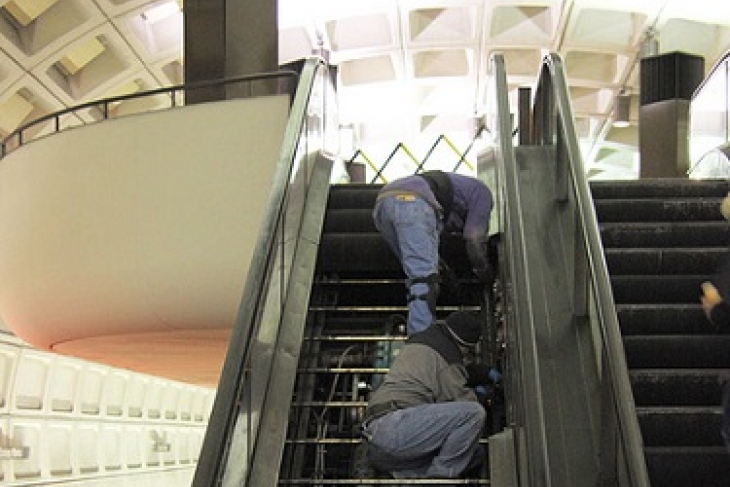Monday afternoon, a Washington, D.C., metro rail train stopped in a tunnel not far from a major station, and the car began filling with smoke. Soon the lights went off and, though many passengers were struggling to breathe, they were told by metro employees to stay put. A spokesman for first responders disputes the timeline, but the Washington Post spoke with passengers who said they were waiting as much as an hour before help arrived. The paper also quotes a fire department spokesman who admitted that, even once they arrived on the scene, "firefighters did not immediately enter the tunnel to help the riders because they were not sure whether the subway’s electrified third rail had been deactivated."
All told, one woman lost her life and eighty-four were hospitalized. In the coming weeks and months we will learn more about how this happened, whether the response was adequate, and whether the accident and subsequent loss of life could have been prevented.
To many riders, accidents like this are not surprising. A 2009 train collision killed nine people. There are also years’ worth of examples documented by bloggers, everyday riders, and journalists of seldom-enforced rules, sloppy workmanship, and bafflingly onerous collectively bargained work rules that sacrifice quality and safety in the interest of other union priorities.
To top it off, system leadership will often downplay the problems to make it seem like everything is under control. A post from Cato's Walter Olson after this most recent incident noted, "Track fires have become common in recent years in the WMATA (Washington Metropolitan Area Transit Authority) rail system, as have train breakdowns, escalator closures, delays, and other disruptions."
While the unceasing work on tracks, trains, switches, and other equipment is often done out of public view, passengers have an up-close view of work done on escalators, which are (as any rider knows) constantly out of service. WMATA watchdog Unsuck DC Metro's defunct blog (the heavy lifting is now done on Twitter) reported in 2010 that the system's escalator woes are likely the result of the union's "pick" system that determines which workers are responsible for which escalators. Just as union rules often put the least experienced teachers with the most challenging kids, so it is with the WMATA's escalators:
"Metro maintenance personnel bid on the escalators for which they’ll be responsible. Workers with the most seniority get the first choices....This way of doing things, [a] source said, ‘destroys the incentive’ of the younger workers who know that if they do a good job, their escalators will be taken away by someone with more seniority."
It's unclear how widely this policy is still used (the most recent contract posted on the WMATA website expired in 2008, and there’s no indication anything’s changed) or whether it is used for other types of maintenance projects. But the practice appears commonplace, and other problems with the system would seem to suggest that something is deeply wrong. Troubling issues commonly cited include additional problems with escalators, the unreliability of rail cars, dangerously bad communication systems, and more.
In 2012, a Washington Times investigation found a depressing "culture of favoritism in which merit has little to do with promotions, and accountability, such as noting safety violations, is a career death knell." One former employee accused the system of, among other things, routinely lying about the state of equipment during inspections. She puts a lot of the blame on the powerful Amalgamated Transit Union 689 for protecting bad employees and dangerous practices, "To write someone up within the 689, you just don’t do that," she told the Times.
Just as in education, the unions and others will defend these practices as the best they can do with the available resources—this despite the fact that the system has seen a massive influx of funding in recent years. Money is clearly being wasted on excessive overtime, massive cost overruns, and delays; then there's the frequent criticism that the union and the politicians they support have turned the system into more of a jobs than a transit program.
No mode of transportation is inherently safe and, as a daily user of public transportation in the nation's capital, it's abundantly clear that the vast majority of workers in the system go to work every day doing their absolute best (and with a positive attitude) to get people safely where they need to go. It's also quite possible that we will learn this most recent incident was a completely unavoidable freak tragedy. These caveats aside, however, it’s apparent that the metro rail system in D.C. (like so many government responsibilities today) is distracted by interests other than what should be its singular focus: safely and reliably serving its customers.

